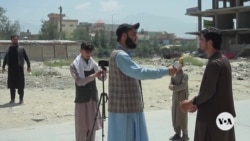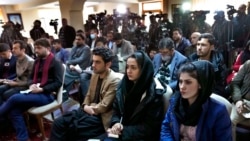ພາຍໃຕ້ການປົກຄອງຂອງກຸ່ມຕາລີບານ, ສື່ຂ່າວທັງຫຼາຍຢູ່ໃນ ອັຟການິສຖານ ແມ່ນຢູ່ໃນກຸ່ມທີ່ມີຄວາມເສລີໜ້ອຍທີ່ສຸດໃນໂລກ ແຕ່ບັນດາ ນັກຂ່າວລຸ້ນໃໝ່ ຍັງຄົງກະຕືລືລົ້ນທີ່ຢາກຈະຮຽນຮູ້ທັກສະດ້ານການລາຍງານຂ່າວ. ເຖິງແມ່ນວ່າ ພວກແມ່ຍິງຈະຖືກຫ້າມບໍ່ໃຫ້ເຂົ້າມະຫາວິທະຍາໄລ ຢູ່ໃນອັຟການິສຖານ ກໍຕາມ ພວກເຂົາເຈົ້າຫາທາງທີ່ຈະຮ່ຳຮຽນໃຫ້ໄດ້.
ຢູ່ໃນຫ້ອງຮຽນແຫ່ງນີ້ ໃນນະຄອນຫຼວງກາບູລ ບັນດານັກຂ່າວລຸ້ນໃໝ່ ກຳລັງ ຮ່ຳຮຽນກ່ຽວກັບສື່ມວນຊົນ.
ແຕ່ພວກນັກຮຽນຢູ່ ສູນກາງສຶກສາວີຊອລ (Wesal Education Center) ກຳລັງເລີ້ມຕົ້ນວິຊາຊີບຂອງພວກເຂົາເຈົ້າ ໃນຊ່ວງເວລາທີ່ຍາກລຳບາກສຳລັບ ຂະແໜງວຽກງານນີ້. ພວກເຂົາເຈົ້າ ກ່າວວ່າ ມີຂໍ້ຈຳກັດຕ່າງໆທີ່ລັດຖະບານ ຂອງ ຕາລີບານ ໄດ້ກຳນົດ ຈຶ່ງເຮັດໃຫ້ມັນຍາກສຳລັບພວກເຂົາ ທີ່ຈະສະແຫວງຫາຕາມຄວາມຝັນຂອງພວກເຂົາ ໃນອາຊີບນັກຂ່າວ.
ພວກເຂົາຍັງຢາກມີປະສົບການໃນການເຮັດວຽກພາຍໃນປະເທດ ຂອງຫ້ອງ ສົ່ງຂ່າວ ທີ່ຍັງເຫຼືອ ຢູ່ໃນອັຟການິສຖານ.
ນັກສຶກສາໃນສາຂາອາຊີບນັກຂ່າວ ທ້າວຄາຟທານ ໂອຕມານຊາຍ ກ່າວວ່າ “ມີຂໍ້ຈຳກັດຫຼາຍຕໍ່ສື່ມວນຊົນ. ພວກເຮົາຢາກໃຫ້ຂໍ້ຈຳກັດທັງຫຼາຍເຫຼົ່ານີ້ຖືກ ຍົກເລີກ. ສອງ, ພວກເຮົາຮຽກຮ້ອງຕໍ່ອົງການສື່ມວນຊົນທັງຫຼາຍ ຈົ່ງສະໜອງ ໂອກາດໃຫ້ພວກເຮົາເຮັດວຽກຢູ່ໃນຫ້ອງສົ່ງເພື່ອຄວາມຄຸ້ນເຄີຍ.”
ທ້າວໂອຕມານຊາຍ ແລະເພື່ອນນັກສຶກສາຂອງລາວ ເລີ້ມຕົ້ນໃນຂະແໜງ ການລາຍງານຂ່າວ ພາຍໃຕ້ເງື່ອນໄຂທີ່ເຄັ່ງຄັດ.
ນັບຕັ້ງແຕ່ ກຸ່ມຕາລີບານ ໄດ້ກັບຄືນມາກຳອຳນາດໃນປີ 2021 ສື່ມວນຊົນ ໄດ້ເຮັດວຽກຢູ່ພາຍໃຕ້ການກວດກາທີ່ເພີ້ມຂຶ້ນນັບມື້ ແລະໃນຄວາມຍາກລຳບາກ ດ້ານເສດຖະກິດຫຼາຍຢ່າງ.
ໃນຄັ້ງນຶ່ງສື່ມວນຊົນເຄີຍມີຊີວິດຊີວາ ແຕ່ມາບັດນີ້ ອັຟການິສຖານ ເປັນປະ ເທດທີ່ມີເສລີພາບດ້ານການຂ່າວທີ່ຂີ້ຮ້າຍທີ່ສຸດອັນດັບສາມ, ໂດຍເປັນອັນດັບ ທີ່ສູງກວ່າປະເທດເກົາຫຼີເໜືອ ແລະອີຣ່ານ ອີງຕາມກຸ່ມສິ້ງຊອມດ້ານສື່ມວນຊົນ ນັກຂ່າວໄຮ້ພົມແດນ ຫຼື Reporters Without Borders.
ແຕ່ເຖິງຢ່າງນັ້ນກໍຕາມ ບັນດາອາຈານຢູ່ ສູນກາງສຶກສາວີຊອລ ກ່າວວ່າ ພວກນັກຮຽນຂອງພວກເພິ່ນ ແມ່ນຍັງມີຄວາມມັກຮັກກ່ຽວກັບການລາຍງານຂ່າວ.
ທ່ານວາຊີມ ວີຊອລ ອາຈານສອນຢູ່ສູນກາງສຶກສາວີຊອລ ກ່າວໃນພາສາ ປາຊໂຕ ວ່າ “ພວກເຂົາເຈົ້າຫວັງວ່າ ພວກເຂົາຈະສາມາດເຮັດວຽກໃນມື້ໃດມື້ນຶ່ງ ຢູ່ໃນສື່ມວນຊົນ. ພວກຂໍ້ຈຳກັດ ແລະບັນຫາຕ່າງໆນັ້ນ ຈະບໍ່ມີຢູ່ຕະຫຼອດໄປດອກ.”
ສູນກາງວີຊອລ ອາດມີນັກສຶກສາຫຼາຍ ແຕ່ບໍ່ມີແມ່ຍິງເລີຍ.
ກຸ່ມຕາລີບານ ໄດ້ຫ້າມບໍ່ໃຫ້ແມ່ຍິງມີການສຶກສາ ຫຼັງຈາກເຂົ້າໂຮງຮຽນລະດັບ ປະຖົມສຶກສາ ແລະພວກນັກຂ່າວແມ່ຍິງຫຼາຍສິບຄົນ ກໍບໍ່ສາມາດເຮັດວຽກໄດ້ ອີກຕໍ່ໄປ ຢູ່ໃນສື່ມວນຊົນ. ສຳລັບຈຳພວກຜູ້ທີ່ຍັງເຮັດວຽກຢູ່ ຕ້ອງໃສ່ເຄື່ອງຄຸມ ຕົວທັງໝົດ ເວລາອອກຂ່າວ.
ທ່ານນາງ ຣາຮີມາ ໄນມີ (Rahima Naime) ອະດີດນັກບັນຍາຍກ່ຽວກັບ ການລາຍງານຂ່າວ ຢູ່ມະຫາວິທະຍາໄລ ຣານາ ໃນນະຄອນຫຼວງກາບູລ. ທ່ານນາງກ່າວວ່າ ການລາຍງາຍຂ່າວ ເຄີຍເປັນສາຂາໃນການຮ່ຳຮຽນທີ່ນິຍົມຊົມຊອບຫຼາຍ ກ່ອນການກັບຄືນມາຂອງກຸ່ມຕາລີບານ.
ທ່ານນາງ ຣາຮີມາ ໄນມີ ກ່າວໃນພາສາດາຣີ ວ່າ “ມີແມ່ຍິງຫຼາຍໆຄົນທີ່ໄດ້ ສຶກສາໃນລະດັບສູງ ໂດຍສະເພາະໃນການລາຍງານຂ່າວ. ມີນັກສຶກສາທີ່ ເປັນແມ່ຍິງຫຼາຍໆຄົນໄຝ່ຝັນໃນການຮຽນຈົບ ແລ້ວເຂົ້າຮ່ວມໃນສາຂາ ວິຊາອາຊີບນີ້.”
ພວກແມ່ຍິງຢູ່ໃນອັຟການິສຖານ ຍັງເຂົ້າຮ່ຳຮຽນໃນຫ້ອງຮຽນທາງອອນໄລນ໌ ທີ່ທ່ານນາງ ໄນມີ ແລະອົງການຈັດຕັ້ງບາງອົງການ ໄດ້ເປີດຮັບສອນຢູ່ນອກພົມແດນຂອງອັຟການິສຖານ.
ແຕ່ເຖິງຈະໄດ້ຮັບການຝຶກອົບຮົມກໍຕາມ ວຽກງານນີ້ ກໍຍັງຄົງມີໜ້ອຍຢູ່. ເຄືອຂ່າຍສື່ມວນຊົນຫຼາຍສິບແຫ່ງໄດ້ຖືກປິດໄປ ນັບຕັ້ງແຕ່ການເຂົ້າກຳອຳນາດ.
ທ່ານຮູຈາທູລລາ ມູຈາດີດີ ເຮັດວຽກກັບສະມາຄົມນັກຂ່າວອິດສະຫຼະຂອງ ອັຟການິສຖານ ກ່າວໃນພາສາປາຊໂຕ ວ່າ “ໂຊກບໍ່ດີ, ເຄືອຂ່າຍສື່ມວນຊົນ ບໍ່ສາມາດສ້າງວຽກເຮັດງານທຳໄດ້ຕື່ມອີກ ເນື່ອງຈາກບັນຫາດ້ານຕ່າງໆທາງ ເສດຖະກິດ. ບຸກຄະລາກອນຂອງພວກເຂົາກໍໄດ້ຫລຸດລົງ. ການແກ້ໄຂກໍແມ່ນ ວ່າ ປະຊາຄົມນານາຊາດຄວນຊ່ອຍໃຫ້ທຶນແກ່ສື່ມວນຊົນ ເພື່ອທີ່ພວກເຂົາ ຈະສາມາດວ່າຈ້າງພວກຊາວໜຸ່ມທີ່ມີການສຶກສາ ແລະມີຄວາມມັກຮັກ.”
ໃນຂະນະທີ່ສື່ມວນຊົນຂອງປະເທດພວມປະເຊີນກັບສະພາບແວດລອມທີ່ຫຍຸ້ງ ຍາກຢູ່ນີ້ ພວກນັກຂ່າວລຸ້ນຕໍ່ໄປ ກຳລັງຮຽນທັກສະຕ່າງໆ ທີ່ພວກເຂົາຕ້ອງ ການ ດ້ວຍຄວາມຫວັງທີ່ວ່າ ຂໍ້ຈຳກັດຕ່າງໆນັ້ນ ຈະຖືກຜ່ອນຜັນ.
Under the Taliban, the news media in Afghanistan are among the least free in the world, but a new generation of journalists is still keen to learn the skills of the trade. Even women, who are barred from attending university in Afghanistan, are finding ways to study. VOA’s Afghan service has the story, narrated by Bezhan Hamdard .
In this classroom in Kabul, a new generation of journalists is learning about media.
But students at the Wesal Education Center are starting their careers at a difficult time for the industry. They say restrictions by the country's Taliban government make it difficult for them to pursue their passion — a career in journalism.
They also want experience working in the country’s remaining newsrooms.
(Kaftan Otmanzai, Journalism Student)
“There are restrictions on media. We want these restrictions to be removed. Second, we request media organizations to provide us with the opportunity to work to become familiar with working in studios.”
Otmanzai and his fellow students are starting out in journalism under dire conditions.
Since the Taliban returned to power in 2021, media have worked under increasing censorship and economic hardships.
Once a vibrant media scene, Afghanistan is now the third worst country for press freedom, ranking just below North Korea and Iran, according to media watchdog Reporters Without Borders.
Still, teachers at Wesal Education Center say that their students are still passionate about journalism.
(Wasim Wesal, Wesal Education Center)
“They hope they will be able to work one day in the media. The restrictions and problems will not be there forever.”
The Wesal center may have students, but none are women.
The Taliban banned women from education after primary school level, and dozens of female journalists can no longer work in media. Those who do must appear fully covered on screen.
Rahima Naime is a former lecturer of journalism at Rana University in Kabul. She says journalism was a popular field of study before the Taliban’s return.
(Rahima Naime, Former Journalism Lecturer)
“There were many women in higher education, particularly in journalism. There were many [female] students dreaming of graduating and taking part in the field.”
Women in Afghanistan still take online classes in journalism that Naime and some organizations offer from outside Afghanistan’s borders.
But even with the training, fewer jobs remain. Dozens of media outlets have shuttered since the takeover.
(Hujatullah Mujadidi, Afghan Independent Journalists Association)
“Unfortunately, media outlets can’t create jobs anymore because of economic problems. Their personnel have decreased. The solution is that the international community should help the media financially so they can employ these educated and passionate youth.”
While the country’s media grapples with a tough environment, the next generation of journalists is learning the skills they need in the hope that restrictions will ease.







ຟໍຣັມສະແດງຄວາມຄິດເຫັນ